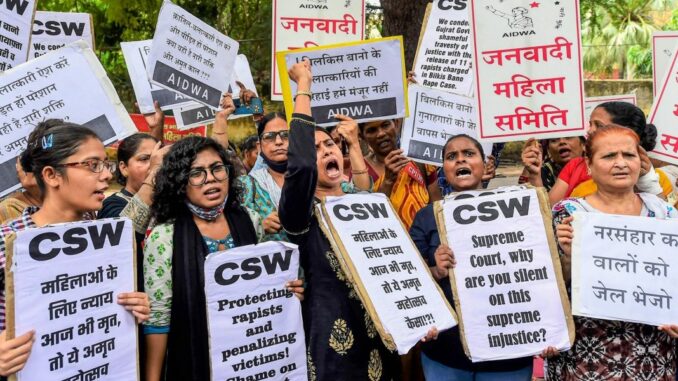
NEW DELHI (TIP): It was as recently as in April that the court had said that the State cannot exercise its remission powers arbitrarily. The Supreme Court has enough ammunition in the form of past judgments to examine the Gujarat Government’s premature release of 11 convicts who were sentenced to life imprisonment for the 2002 Bilkis Bano gangrape case. For one, on April 23, 2019, the court, while awarding her ₹50 lakh in compensation, described how the “brutal, diabolic, gruesome, horrific acts of violence” committed on her has left an “indelible imprint on her mind which will continue to torment and cripple her”.
The apex court had noted that the then 21-year-old and pregnant Ms. Bilkis was “repeatedly gangraped”. She was a “mute and helpless witness to her three-and-a-half-year-old daughter butchered to death”. She had lost all the members of her family while fleeing the mayhem and violence of the 2002 riots. The court said she had lived the life of a nomad, an orphan.
The State government’s decision to remit the sentence of the 11 convicts has raised a furious public outcry. Civil rights groups have urged the Supreme Court to revoke the remission. Ms. Bilkis’s family has told the media that they are scared of what may happen to them in the future. The fact that the crimes were committed on Ms. Bilkis in the background of violence which affected the entire State; the apprehensions voiced by her family following the release of the convicts, and the warm welcome reported to have been accorded to the 11 men when they came out of jail, make the Laxman Naskar judgment relevant in this case.
The Supreme Court, if it takes up the issue of remission in the Bilkis case, should also examine whether the State had been guided by the opinion of the presiding officer of the sentencing court on the remission applications.
In Union of India Vs. Sriharan @ Murugan , the apex court said the presiding judge’s opinion would shed light on factors like the nature of the crime that was committed, the record of the convicts, their backgrounds and other relevant factors, which would enable the government to take the “right” decision as to whether or not the sentence should be remitted. After all, as the Supreme Court observed in Nandini Sundar Vs. Chhattisgarh, it is the “responsibility of the States to prevent untoward incidents and to prevent crime”. In its 2018 decision in the Tehseen Poonawalla case on mob violence and lynching, the court considered the “targeted violence and commission of offences affecting the human body and against private and public property by mobs under the garb of self-assumed and self-appointed protectors of law”. Here, the court noted that “horrendous acts of mobocracy” should not become the “new normal”. The apex court had warned the State against turning “a deaf ear to the growing rumblings of its people”.





Be the first to comment